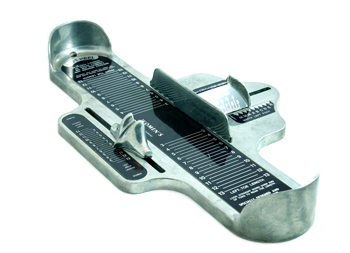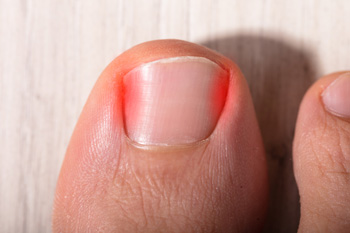August 2019
Foot Aches During Pregnancy
General foot pain is a common ailment many pregnant women experience. The arches of the foot may disappear as the weight of the body increases, and this can produce a considerable amount of discomfort. The ankles will often become swollen during the latter half of pregnancy, and this may be a result of increased blood pressure. Relief can be found while frequent rests are taken, and it is also beneficial to elevate the feet. Many pregnant women notice ingrown toenails, and this can be due to any changes that may occur in the shape and size of the nail. Research has shown that it is helpful to frequently perform gentle exercises, in addition to drinking plenty of water daily. If you would like additional information on how pregnancy affects the feet, it is recommended that you speak with a podiatrist.
Pregnant women with swollen feet can be treated with a variety of different methods that are readily available. For more information about other cures for swollen feet during pregnancy, consult with one of our podiatrists from Central Ohio Comprehensive Foot Care. Our doctors will attend to all of your foot and ankle needs.
What Foot Problems Can Arise During Pregnancy?
One problem that can occur is overpronation, which occurs when the arch of the foot flattens and tends to roll inward. This can cause pain and discomfort in your heels while you’re walking or even just standing up, trying to support your baby.
Another problem is edema, or swelling in the extremities. This often affects the feet during pregnancy but tends to occur in the later stages.
How Can I Keep My Feet Healthy During Pregnancy?
- Wearing orthotics can provide extra support for the feet and help distribute weight evenly
- Minimize the amount of time spent walking barefoot
- Wear shoes with good arch support
- Wear shoes that allow for good circulation to the feet
- Elevate feet if you experience swelling
- Massage your feet
- Get regular, light exercise, such as walking, to promote blood circulation to the feet
If you have any questions please feel free to contact one of our offices located in Delaware and Westerville, OH . We offer the newest diagnostic and treatment technologies for all your foot and ankle needs.
What Is a Brannock Device?
 Research has shown the importance of properly measuring your feet before shoes are purchased. This can be done by using a Brannock device which is found in the majority of shoe stores. It is helpful to measure your feet and try shoes on during the afternoon, when the feet are typically at their largest for the day. A properly fitting shoe should feel comfortable when tried on, and will have adequate room for the toes to move freely in. It can help to determine the correct shoe size by wearing socks that would be worn with the shoes, in addition to walking on carpeting and hard surfaces before you decide to purchase them. If your foot becomes irritated, the shoes may have tags on the inside of them which need to be removed. If you have any questions about how to buy shoes that fit properly, please consult with a podiatrist.
Research has shown the importance of properly measuring your feet before shoes are purchased. This can be done by using a Brannock device which is found in the majority of shoe stores. It is helpful to measure your feet and try shoes on during the afternoon, when the feet are typically at their largest for the day. A properly fitting shoe should feel comfortable when tried on, and will have adequate room for the toes to move freely in. It can help to determine the correct shoe size by wearing socks that would be worn with the shoes, in addition to walking on carpeting and hard surfaces before you decide to purchase them. If your foot becomes irritated, the shoes may have tags on the inside of them which need to be removed. If you have any questions about how to buy shoes that fit properly, please consult with a podiatrist.
It is important to find shoes that fit you properly in order to avoid a variety of different foot problems. For more information about treatment, contact one of our podiatrists from Central Ohio Comprehensive Foot Care. Our doctors will treat your foot and ankle needs.
Proper Shoe Fitting
Shoes have many different functions. They cushion our body weight, protect our feet, and allow us to safely play sports. You should always make sure that the shoes you wear fit you properly in order to avoid injuries and deformities such as: bunions, corns, calluses, hammertoes, plantar fasciitis, stress fractures, and more. It is important to note that although a certain pair of shoes might be a great fit for someone else, that doesn’t mean they will be a great fit for you. This is why you should always try on shoes before buying them to make sure they are worth the investment. Typically, shoes need to be replaced ever six months to one year of regular use.
Tips for Proper Shoe Fitting
- Select a shoe that is shaped like your foot
- Don’t buy shoes that fit too tight, expecting them to stretch to fit
- Make sure there is enough space (3/8” to ½”) for your longest toe at the end of each shoe when you are standing up
- Walk in the shoes to make sure they fit and feel right
- Don’t select shoes by the size marked inside the shoe, but by how the shoe fits your foot
The shoes you buy should always feel as good as they look. Shoes that fit properly will last longer, feel better, and improve your way of life each day.
If you have any questions, please feel free to contact one of our offices located in Delaware and Westerville, OH . We offer the newest diagnostic and treatment technologies for all your foot care needs.
Ingrown Toenails Can Cause Pain
The symptoms of an ingrown toenail can be quite noticeable. They typically consist of red and swollen skin on the sides of the big toe, and it generally causes pain and discomfort. It can occur as a result of wearing shoes that do not fit properly, and this can possibly cause the toenail to grow into the surrounding skin. If your child has an ingrown toenail, they may find mild relief when the affected toe is soaked in warm water. This may help to move the swollen portion of skin away from the nail. It may be beneficial to wear sandals as the healing process occurs, and this can help to keep pressure off of the nail. If you are afflicted with an ingrown toenail, it is strongly advised that you seek the counsel of a podiatrist who can properly treat this condition.
Ingrown toenails can become painful if they are not treated properly. For more information about ingrown toenails, contact one of our podiatrists of Central Ohio Comprehensive Foot Care. Our doctors can provide the care you need to keep you pain-free and on your feet.
Ingrown Toenails
Ingrown toenails occur when a toenail grows sideways into the bed of the nail, causing pain, swelling, and possibly infection.
Causes
- Bacterial infections
- Improper nail cutting such as cutting it too short or not straight across
- Trauma to the toe, such as stubbing, which causes the nail to grow back irregularly
- Ill-fitting shoes that bunch the toes too close together
- Genetic predisposition
Prevention
Because ingrown toenails are not something found outside of shoe-wearing cultures, going barefoot as often as possible will decrease the likeliness of developing ingrown toenails. Wearing proper fitting shoes and using proper cutting techniques will also help decrease your risk of developing ingrown toenails.
Treatment
Ingrown toenails are a very treatable foot condition. In minor cases, soaking the affected area in salt or antibacterial soaps will not only help with the ingrown nail itself, but also help prevent any infections from occurring. In more severe cases, surgery is an option. In either case, speaking to your podiatrist about this condition will help you get a better understanding of specific treatment options that are right for you.
If you have any questions please feel free to contact one of our offices located in Delaware and Westerville, OH . We offer the newest diagnostic and treatment technologies for all your foot and ankle needs.










